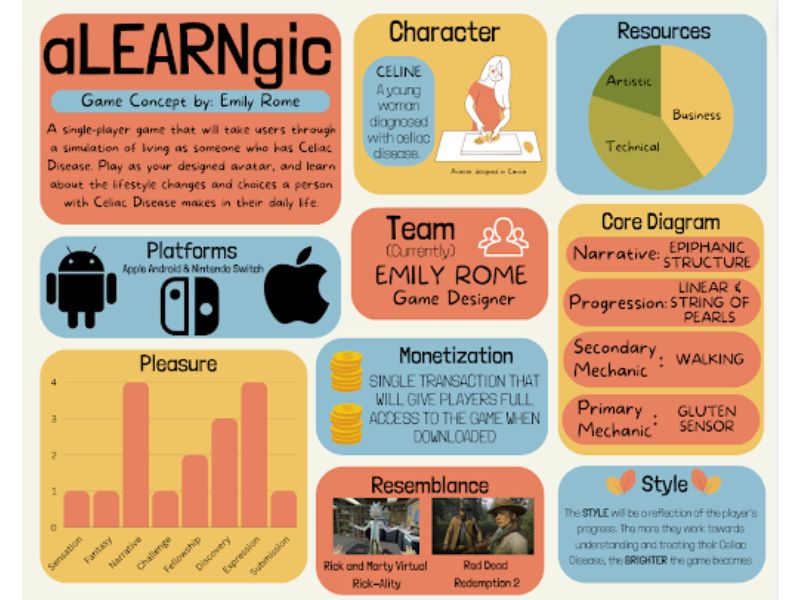RTA Sport Media student creates video game to raise awareness about celiac disease
Fourth-year RTA Sport Media student Emily Rome developed a video game called aLEARNgic in the course ‘Introduction to Game Design’. With the aim of raising awareness, the game allows users to play as Celine, a woman diagnosed with celiac disease to learn more about the lifestyle changes and choices a person with the autoimmune disease makes in their life.

Inspiration behind the game
At the age of 20, Rome learned about her celiac disease diagnosis and was forced into adapting to a gluten-free lifestyle.
As recalled by Rome, “while I was excited to feel more comfortable and improve my overall health, I was warned by doctors and dietitians that the learning curve was steep. Using the word steep is a bit of an understatement, as I had to learn what to watch out for on food labels, what foods are commonly processed in gluten, and how to advocate for myself at a restaurant, without making a waiter feel like they are being interrogated; the list goes on.”
Her diagnosis inspired her to develop this game to share her experience with others and showcase the lifestyle changes she’s had to make.

The graphic illustrates the concept of the game. It includes 10 sections: “aLEARNgic,” “platforms,” “pleasure,” “character,” “team,” “monetization,” “resemblance,” “resources,” “core diagram,” and “style” all with text and graphic illustrations. Courtesy of Emily Rome.
From RTA Sport Media to aLEARNgic
RTA Sport Media at The Creative School is the first program of its kind in North America where students learn sport entertainment management, sport journalism, live production, on-air hosting and multiplatform marketing. As Rome expressed, she has gained the necessary communication skills to not only describe the video game concept but also communicate the need for this kind of video game.
“I am more confident in my ideas and am able to articulate them concisely. In terms of creating a tangible video game, I am currently learning how to use ‘Unreal Engine’ in Game Design II taught by RTA Media Professor Dr. Kristopher Alexander in the Red Bull Gaming Hub,” said Rome.
Audience takeaways
When designing this video game, Rome had a goal in mind to help all those diagnosed with celiac disease, such as understanding cross-contamination, and advocations for nutritional needs at restaurants, among other things.
“This game is also designed for their friends, family and loved ones to understand the nuances and difficulties that come with this autoimmune disorder. At the time of my diagnosis, I was feeling frustrated and felt like a burden to those around me,” says Rome.
The game recognizes the gap in the educational video game market by providing a platform which allows users to understand the experiences of someone living with celiac disease. Similarly, the game helps destigmatize celiac disease and provides people with a better understanding of autoimmune disease along with an appreciation of the daily celiac challenges.
To learn more about the RTA School of Media Introduction to Game Design course, visit the course calendar (opens in new window) .
The Creative School at Toronto Metropolitan University
The Creative School is a dynamic faculty that is making a difference in new, unexplored ways. Made up of Canada’s top professional schools and transdisciplinary hubs in media, communication, design and cultural industries, The Creative School offers students an unparalleled global experience in the heart of downtown Toronto.
